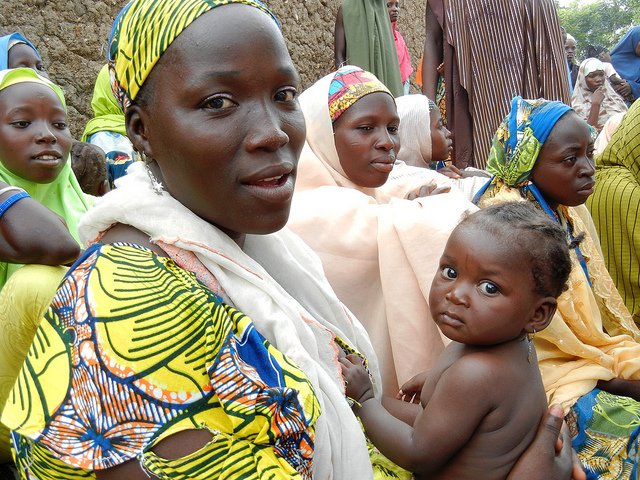"Achieving an HIV-free generation for Nigeria"
September 26 The prevalence of HIV among women in Nigeria deeply worries Adebayo Victor, 25, a Correspondent from Ibadan in Nigeria, who describes his work training community health extension workers to reduce transmission from mothers to children.
The prevalence of HIV among women in Nigeria deeply worries Adebayo Victor, 25, a Correspondent from Ibadan in Nigeria, who describes his work training community health extension workers to reduce transmission from mothers to children.
Approximately 51.5 per cent of adults living with HIV in Nigeria are women. Presently, the south-south region of the country has the highest burden of mother-to-child transmission (MCT) with Cross River State having a high HIV prevalence of 7.1 per cent compared with the national prevalence of 4.1 per cent. This has become a critical health problem that threatens to undermine the positive impact of child survival strategies in the state and Nigeria as a whole.
Over 95 per cent of pediatric HIV cases are acquired through mother-to child transmission. This high burden is due to unsafe sexual practices among adults, increased prevalence in women of reproductive age, high total fertility age and breastfeeding culture that is characteristically prolonged with poor access to preventative interventions. Mother-to-child transmission of HIV can occur during pregnancy, labour, delivery and breastfeeding, therefore Community Health Extension Workers (CHEWs) managing these stages of care have an important responsibility to prevent mother-to-child transmission of HIV.
The prevalence statistics suggest community-based programmes that ensure training of CHEWs on Integrated Management of Pregnancy and Childbirth (IMPAC) in preventing MTC transmission, family planning and reproductive health – and subsequently activating their Primary Health Centers for preventing mother-to-child transmission services – would effectively prevent and ultimately eliminate mother-to-child transmission of HIV, increase access to formal health care services in general, and boost attendance of antenatal care with PMTCT interventions for HIV positive pregnant mothers.
As part of the ongoing efforts to curb this menace in Nigeria, a public health project was birthed in September 2011, tagged Strengthening Integrated Delivery of HIV/AIDS Services (SIDHAS). It is designed to build local capacity for the delivery of sustainable, high-quality and comprehensive HIV/AIDS prevention, treatment, care and support services. SIDHAS is implemented by a consortium of nine partners with FHI 360 as the prime partner in 36 states of Nigeria.
In Cross River state, the SIDHAS project has been in top gear since its implementation. An IMPAC training was organized in October 2013 aimed to update CHEWs on evidence-based training in the management of pregnancy, labour, delivery, postpartum and newborn care within the context of HIV infection. This ensures that CHEWs integrate PMTCT interventions into routine maternal care services and make sure pregnant HIV-positive women receive both types of care in the same visit to Primary Health Centers.
Four CHEWs per facility were selected in various primary health centers and health posts in the state. They were trained in four thematic areas where PMTCT interventions can be provided namely; clinical, pharmacy, laboratory and monitoring and evaluation. The training adopted a participatory and interactive module appraisal, and the participants worked through the sessions with the aid of facilitators. Knowledge was impacted through a combination of individual reading, group discussions, exercise case studies and role play.
Aside from the knowledge shared during the week-long training, the various facilities provided PMTCT services by supplying the necessary tools, job aids, rapid tests kits and ARV drugs to the facility. Routine HCT was demonstrated by the CHEWs at their various facilities to the activation team of the SIDHAS project, while appropriate intervention were provided to positive pregnant mothers and other HIV positive people were referred to comprehensive sites for service provision and close monitoring.
Presently in Cross River State, the SIDHAS project is providing sustainable gains towards improving global health, particularly in preventing mother-to-child transmission of HIV, getting to zero level of stigmatization and eliminating new HIV infection.
I have always believed the best way of applying my knowledge and skills is in the science of improving lives and making the world a fairer place. As I work as a pharmacy facilitator with the State Implementation Team of FHI 360, achieving an HIV free generation for children in Nigeria would soon be achieved through our team effort.
photo credit: DFID – UK Department for International Development via photopin cc
…………………………………………………………………………………………………………………
About me: I am a young and dynamic bilingual health care professional with a staunch desire to help others in my local community and in other parts of the world.
As an Ex-Intern of Centre Hopitalier Universitaire and International Committee of Red Cross in Cote D’Ivoire I’m also an aspiring success catalyst.
I currently work as a consultant with Family Health International (www.fhi360.org) Cross River State, Nigeria.
…………………………………………………………………………………………………………………
Opinions expressed in this article are those of the author and do not necessarily represent the views of the Commonwealth Youth Programme. Articles are published in a spirit of dialogue, respect and understanding. If you disagree, why not submit a response?
To learn more about becoming a Commonwealth Correspondent please visit: http://www.yourcommonwealth.org/submit-articles/commonwealthcorrespondents/
…………………………………………………………………………………………………………………




